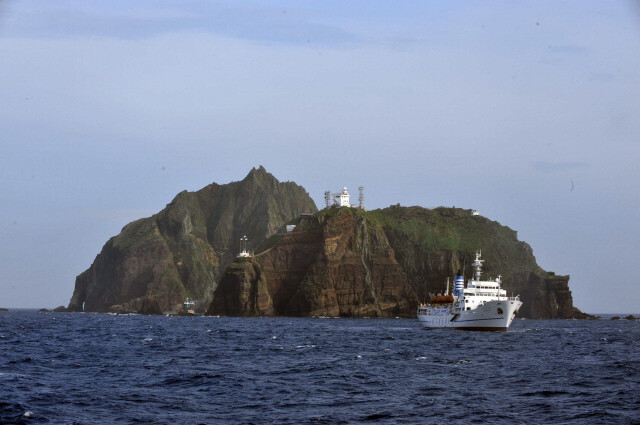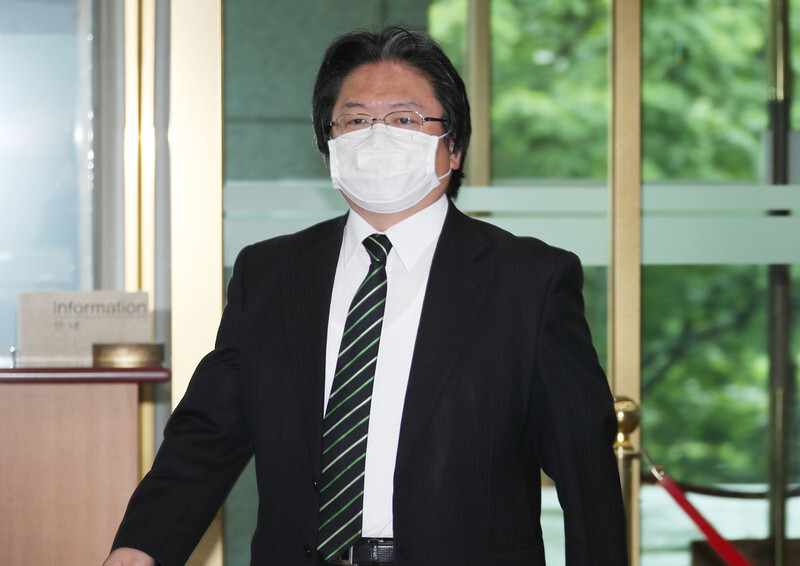hankyoreh
Links to other country sites 다른 나라 사이트 링크
Japan continues to claim S. Korea is illegally occupying Dokdo

The South Korean government sent a strong message on May 19 asserting the Dokdo islets to be “South Korea’s sovereign territory” in response to the Japanese government’s repeated claim in a Ministry of Foreign Affairs document that South Korea was “illegally occupying” the islets.
Referring to Dokdo in its 2020 Diplomatic Bluebook as reported to the Cabinet council that day, the Japanese Ministry of Foreign Affairs said, “Even in terms of historical records, Takeshima [the name used by Japan to refer to Dokdo] is clearly Japan’s sovereign territory by international law.”
“South Korea continues to illegally occupy Takeshima with no basis whatsoever,” it continued.
Since 2018, the Japanese government has been using the more strongly worded expression “illegal occupation” in its claims of ownership over Dokdo. The Diplomatic Bluebook outlines the out the Ministry of Foreign Affairs’ views regarding its diplomatic situation, prospects, and international conditions.
In response, the South Korean Ministry of Foreign Affairs (MOFA) issued a statement credited to a spokesperson.
“We strongly protest the Japanese government’s reiteration of its unjustified territorial claims regarding Dokdo, which is clearly South Korea’s inherent territory by history, geography, and international law, and we urge it to immediately retract them,” the statement said. Kim Jeong-han, the director of MOFA’s Asia-Pacific bureau, reportedly summoned Hirohisa Soma, minister of the Japanese Embassy in Seoul, to MOFA in Seoul’s Jongno District to express dismay about the remarks regarding Dokdo.

Japan reiterates position on other bilateral issues
In addition to Dokdo, the Japanese government also reiterated other claims concerning heated issues in South Korea-Japan relations in its Diplomatic Bluebook. The controls that Japan has imposed on exports to South Korea since last year were characterized as being “intended to suitably manage trade in goods and technology that could be diverted for military purposes.” On the Japanese military comfort women issue, it reiterated its 2019 position that the “expression ‘sex slavery’ should not be used, as it is contrary to the facts,” adding that this “was confirmed by South Korea itself at the time of the South Korea-Japan comfort women agreement in 2015.” MOFA has since protested that Tokyo was “arbitrarily interpreting” Seoul’s position on the issue.
At the same time, Japan also referred to South Korea as an “important neighbor” for the first time in three years. South Korea had been described in the 2017 Diplomatic Bluebook as Japan’s “most important neighbor sharing strategic interests,” but the phrase was subsequently omitted in 2018 and 2019. The return of the “important neighbor” expression was seen as an indication that Tokyo does not want any further souring in its relations with Seoul, which have been spiraling into deeper conflict since a South Korean Supreme Court ruling on the forced labor mobilization issue.
“Deteriorating relations with South Korea are a burden for Japan as well, and this appears to be the Japanese government’s attempt to manage the situation,” said Lee Jong-won, a professor at Waseda University.
By Cho Ki-weon, Tokyo correspondent, and Kim So-youn, staff reporter
Please direct comments or questions to [english@hani.co.kr]

Editorial・opinion
![[Column] Season 2 of special prosecutor probe may be coming to Korea soon [Column] Season 2 of special prosecutor probe may be coming to Korea soon](https://flexible.img.hani.co.kr/flexible/normal/500/300/imgdb/original/2024/0426/3317141030699447.jpg) [Column] Season 2 of special prosecutor probe may be coming to Korea soon
[Column] Season 2 of special prosecutor probe may be coming to Korea soon![[Column] Park Geun-hye déjà vu in Yoon Suk-yeol [Column] Park Geun-hye déjà vu in Yoon Suk-yeol](https://flexible.img.hani.co.kr/flexible/normal/500/300/imgdb/original/2024/0424/651713945113788.jpg) [Column] Park Geun-hye déjà vu in Yoon Suk-yeol
[Column] Park Geun-hye déjà vu in Yoon Suk-yeol- [Editorial] New weight of N. Korea’s nuclear threats makes dialogue all the more urgent
- [Guest essay] The real reason Korea’s new right wants to dub Rhee a founding father
- [Column] ‘Choson’: Is it time we start referring to N. Korea in its own terms?
- [Editorial] Japan’s rewriting of history with Korea has gone too far
- [Column] The president’s questionable capacity for dialogue
- [Column] Are chaebol firms just pizza pies for families to divvy up as they please?
- [Column] Has Korea, too, crossed the Rubicon on China?
- [Correspondent’s column] In Japan’s alliance with US, echoes of its past alliances with UK
Most viewed articles
- 1AI is catching up with humans at a ‘shocking’ rate
- 2After election rout, Yoon’s left with 3 choices for dealing with the opposition
- 3[Column] Season 2 of special prosecutor probe may be coming to Korea soon
- 4No good, very bad game for Korea puts it out of Olympics for first time since 1988
- 5Korea’s 1.3% growth in Q1 signals ‘textbook’ return to growth, says government
- 6Is Japan about to snatch control of Line messenger from Korea’s Naver?
- 7[Column] Park Geun-hye déjà vu in Yoon Suk-yeol
- 8Division commander ordered troops to enter raging flood waters before Marine died, survivor says
- 9Marriages nosedived 40% over last 10 years in Korea, a factor in low birth rate
- 10‘We must say no’: Seoul defense chief on Korean, USFK involvement in hypothetical Taiwan crisis